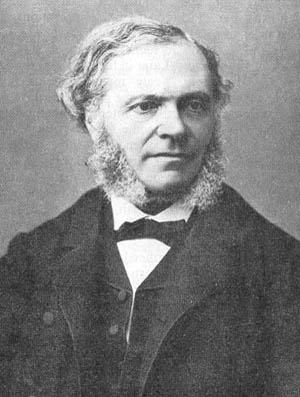César Franck
Psyché, symphonic poem for chorus & orchestra (also arr. for piano, 4 hands), FWV 47
Description by Adrian Corleonis [-]
Vincent d’Indy‘s portrait of Franck as the pater seraphicus of music — selfless, saintly, and wise — shepherding his small but influential band of disciples in the green pastures of noble idealism is surprisingly accurate as far as it goes, though it carefully bowdlerizes a recurrent undertow of barely suppressed sensuality. Marooned in an unhappy marriage and a career as church organist, Franck‘s intense inner life became apparent only at chance moments, and most fully in his music.
Thus, it is telling that one of his most ambitious works, Psyché — a vast “symphonic poem” for chorus and orchestra in seven movements — was composed in secret in his vacation retreat at Combs-la-Ville-Quincy over the summer of 1886. To his friend and pupil, the composer Arthur Coquard, he confided that Psyché had been contemplated over “many years,” though the progress of the composition is noted on the manuscript with a compulsive punctilio — e.g., “‘Les jardins d’Éros,’ 18 August, (4 o’clock).” Orchestration was accomplished the following summer. The story is drawn from the second century Metamorphoses (often translated as The Golden Ass) of Lucius Apuleius which tells of Eros’ nocturnally veiled love for the mortal Psyche, Psyche’s wish to behold her lover face to face, and the lovers’ parting and reconciliation. In Franck‘s retelling, Psyché first dreams of Éros, then is carried by zephyrs to Éros’ secret garden, where the orchestra enacts a rapturous love duet as the chorus (sopranos I and II, tenors) warns her that she must never seek to see the face of her mysterious lover. In its undulating melodic richness and sensuous scoring Franck captures more nearly than anything in music what Blake called “the lineaments of gratified desire.” The aftermath of her transgression — narrated by the chorus — is as profoundly moving as the final luminous apotheosis is compellingly ecstatic. Psyché’s premiere, at a concert of the Société National de Musique on March 10, 1888, disconcerted listeners and provoked controversy, with the dedicatee, d’Indy, insisting that the music was an allegory of the love of God, and others — not least, the composer’s family — hearing in it an execrable carnality. As Nietzsche noted, “The degree and kind of a man’s sexuality reach up into the ultimate pinnacle of his spirit.” Largely neglected, Psyché looms as Franck‘s most revealing testament.
Parts/Movements
- Le sommeil de Psyche
- Psyche enlevée par les zephirs
- Le Jardin d’Éros
- Amour! Amour! source de toute vie!
- Psyche et Éros
- Le chatiment: Amour, Elle a connu ton nom. Malheur sur elle!
- Souffrances et plaintes de Psyche
- Apothéose: Éros a pardonn’. Tressoillez, cieux et terre!
https://www.allmusic.com/composition/psych%C3%A9-symphonic-poem-for-chorus-orchestra-also-arr-for-piano-4-hands-fwv-47-mc0002369479

